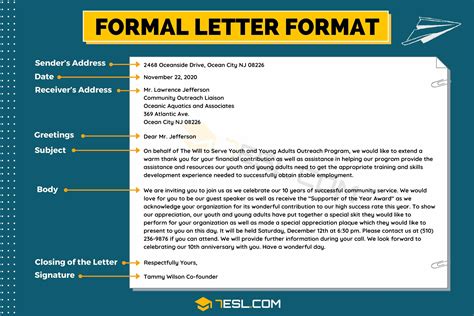Letter Format & Writing Tips

Writing a letter can be a daunting task, but with the right format and tips, you can create a clear and concise message that effectively communicates your thoughts, feelings, or ideas. Whether you’re writing a personal letter, a business letter, or a formal letter, this guide will provide you with the essential elements and strategies to create a well-structured and professional letter.
Why Writing a Letter Matters
Letter writing is an art that has been around for centuries. It is a powerful way to communicate with others, express your feelings, and build relationships. Here are some reasons why writing a letter matters:
- Personal connection: A letter allows you to connect with the recipient on a personal level and convey your thoughts and emotions in a more meaningful way than other forms of communication.
- Memorable: A well-written letter can be a keepsake that the recipient will cherish and revisit for years to come.
- Professionalism: In the business world, a letter is a formal way to communicate with clients, colleagues, or other organizations. It conveys a sense of professionalism and respect.
- Documentation: A letter provides a written record of the communication, which can be useful for legal or official purposes.
Essential Elements of a Letter
Whether you’re writing a personal letter or a business letter, there are a few essential elements that you should include:
1. Heading
The heading includes your name and address, the date, and the recipient’s name and address. It should be placed at the top of the letter and aligned to the left margin.
2. Salutation
The salutation is the greeting that you use to address the recipient. It can be formal or informal depending on the context of the letter. For example:
- Dear Mr./Ms. Last Name: Formal
- Dear First Name: Informal
3. Body
The body of the letter is where you write the main message. It should be well-structured, clear, and concise. Use short paragraphs and avoid long, complex sentences. Make sure to stay on topic and focus on the purpose of the letter.
4. Closing
The closing is the part of the letter where you say goodbye to the recipient. It should be polite and professional. Some common closings include:
- Sincerely,
- Best regards,
- Yours truly,
5. Signature
The signature is where you sign your name. If the letter is formal, you should also include your title and contact information.
Tips for Writing a Letter
Here are some tips to help you write a clear, concise, and effective letter:
1. Know Your Purpose
Before you start writing, make sure you know the purpose of the letter. Is it to express gratitude, ask for a favor, or provide information? Knowing your purpose will help you stay focused and write a more effective letter.
2. Use Proper Grammar and Spelling
Make sure to use proper grammar and spelling. Poor grammar and spelling can make your letter difficult to read and detract from your message.
3. Be Polite and Professional
Use polite and professional language, even if the letter is informal. Avoid using slang or offensive language that could be misinterpreted.
4. Keep it Concise
A letter should be concise and to the point. Avoid rambling or going off-topic. Stick to the purpose of the letter and use short paragraphs to make it easier to read.
5. Proofread and Edit
Before you send the letter, make sure to proofread and edit it for errors. It’s a good idea to have someone else read it as well to catch any mistakes that you might have missed.
Conclusion
Writing a letter can be a powerful way to communicate with others, express your thoughts and feelings, and build relationships. By following the essential elements and tips outlined in this guide, you can create a well-structured and professional letter that effectively communicates your message.
FAQs
What is the difference between a personal letter and a business letter?
A personal letter is usually written to a friend or family member and is more informal in tone. A business letter is usually written to a colleague, client, or other organization and is more formal in tone.
What should I include in the body of the letter?
The body of the letter should include the main message that you want to convey. Make sure to stay on topic and focus on the purpose of the letter.
How should I address the recipient?
The salutation should be polite and appropriate for the context of the letter. If you’re not sure how to address the recipient, use a formal salutation.
How can I make my letter more engaging?
You can make your letter more engaging by using personal anecdotes, asking questions, or using a conversational tone. Make sure to stay professional and on-topic, however.
What should I do if I make a mistake in the letter?
If you make a mistake in the letter, you can either cross it out neatly or start over. If the mistake is minor, it may be best to simply ignore it and move on.
